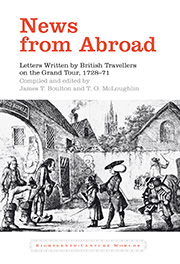Book contents
- Frontmatter
- Contents
- Preface
- Illustrations
- Acknowledgements
- ‘Old Style’ and ‘New Style’ Dating
- Map
- Introduction: The Grand Tour
- The Tourists and Their Letters
- George Lyttelton (1709–73): Letters (1728–30)
- Joseph Spence (1699–1768): Letters (1730–3)
- James Boswell (1740–95): Letters (1764–6)
- James Barry (1741–1806): Letters (1765–71)
- Caroline Lennox (1723–74): Letters (1766–7)
- Appendix A The Hazards of Collecting Art on the Grand Tour
- Appendix B Advice to Travellers on the Grand Tour
- Bibliography
- Index
Caroline Lennox (1723–74): Letters (1766–7)
- Frontmatter
- Contents
- Preface
- Illustrations
- Acknowledgements
- ‘Old Style’ and ‘New Style’ Dating
- Map
- Introduction: The Grand Tour
- The Tourists and Their Letters
- George Lyttelton (1709–73): Letters (1728–30)
- Joseph Spence (1699–1768): Letters (1730–3)
- James Boswell (1740–95): Letters (1764–6)
- James Barry (1741–1806): Letters (1765–71)
- Caroline Lennox (1723–74): Letters (1766–7)
- Appendix A The Hazards of Collecting Art on the Grand Tour
- Appendix B Advice to Travellers on the Grand Tour
- Bibliography
- Index
Summary
I love vastly to see places where such and such people have been, and where great Events have hap'ned. And that pleasure is great in Italy, the more so as the things hap'ned so long ago, and that just now I'm more read in Antient than modern History… The ruins and remains of the Roman Empire really amuse [i.e astonish] me. [19 December 1766]
IN WORDS which could have been used by perhaps the majority of travellers on the Grand Tour, Caroline Lennox wrote from Naples to her sister Emily, Marchioness of Kildare (from November 1766, Duchess of Leinster). Her social position made the ambition she describes one that could be realised. Her father, Charles Lennox (1701–50), prominent in the English Court, succeeded to the title of Duke of Richmond in the year of her birth; her mother, Lady Sarah Cadogan (1706–51), born at The Hague, was accustomed all her life to living in the Dutch Court where Caroline's grandfather, Earl Cadogan, had been British Envoy, and then Ambassador. It is therefore not surprising that Caroline was used to Continental travel and was encouraged by education (partly in French) to pursue interests beyond the borders of her native country. There seem to have been few or no constraints on her visits to France: no paternal warnings about expenditure such as dogged George Lyttelton, no paternal directions as to where or how often she should travel such as suffered by James Boswell. But she had her own difficulties.
- Type
- Chapter
- Information
- News from AbroadLetters Written by British Travellers on the Grand Tour, 1728–71, pp. 213 - 259Publisher: Liverpool University PressPrint publication year: 2012



